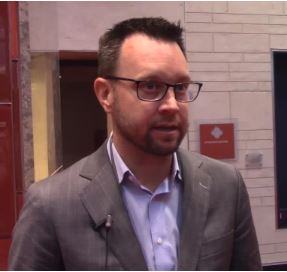User login
SAN ANTONIO – Although the research is in early phases, (IPF), Justin Oldham, MD, said in a plenary presentation at the annual meeting of the American College of Chest Physicians.

“IPF is a highly variable disease,” said Dr. Oldham, director of the Interstitial Lung Disease Program at the University of California, Davis. “Some patients have more rapidly progressive disease than others, and so using precision medicine to identify those who are most likely to have that progressive phenotype is very important, not only for risk stratification but also treatment considerations.”
Some retrospective studies suggest certain subgroups of patients with IPF are genetically predisposed to respond to certain types of therapy, he said in a video interview. Now, researchers are in the process of submitting grants to better study that in a prospective fashion.
Dr. Oldham reported receiving funding from the National Institutes of Health, the American Lung Association, and the ACCP, as well as consulting and speaker fees from Genentech and Boehringer Ingelheim.
SAN ANTONIO – Although the research is in early phases, (IPF), Justin Oldham, MD, said in a plenary presentation at the annual meeting of the American College of Chest Physicians.

“IPF is a highly variable disease,” said Dr. Oldham, director of the Interstitial Lung Disease Program at the University of California, Davis. “Some patients have more rapidly progressive disease than others, and so using precision medicine to identify those who are most likely to have that progressive phenotype is very important, not only for risk stratification but also treatment considerations.”
Some retrospective studies suggest certain subgroups of patients with IPF are genetically predisposed to respond to certain types of therapy, he said in a video interview. Now, researchers are in the process of submitting grants to better study that in a prospective fashion.
Dr. Oldham reported receiving funding from the National Institutes of Health, the American Lung Association, and the ACCP, as well as consulting and speaker fees from Genentech and Boehringer Ingelheim.
SAN ANTONIO – Although the research is in early phases, (IPF), Justin Oldham, MD, said in a plenary presentation at the annual meeting of the American College of Chest Physicians.

“IPF is a highly variable disease,” said Dr. Oldham, director of the Interstitial Lung Disease Program at the University of California, Davis. “Some patients have more rapidly progressive disease than others, and so using precision medicine to identify those who are most likely to have that progressive phenotype is very important, not only for risk stratification but also treatment considerations.”
Some retrospective studies suggest certain subgroups of patients with IPF are genetically predisposed to respond to certain types of therapy, he said in a video interview. Now, researchers are in the process of submitting grants to better study that in a prospective fashion.
Dr. Oldham reported receiving funding from the National Institutes of Health, the American Lung Association, and the ACCP, as well as consulting and speaker fees from Genentech and Boehringer Ingelheim.
EXPERT ANALYSIS FROM CHEST 2018
